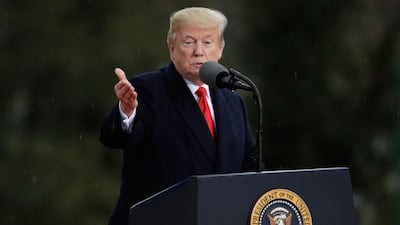US strategy in the Middle East has become increasingly muddled during President Donald Trump’s administration and has contributed to the polarisation of bipartisan camps on Middle East foreign policy, say analysts.
Danielle Pletka, vice president of the American Enterprise Institute, said that extreme reactions to the Trump administration’s foreign policies were leading to a dangerous domestic environment in the US.
“Over the last two years, I find my Democrat friends associating themselves in the Middle East with Iran and my Republican friends associating themselves with Saudi Arabia, Israel and the UAE. That is not a good way for us to conduct foreign policy,” Ms Pletka said at the 5th Abu Dhabi Strategic Debate on Sunday.
Creating political camps based on foreign countries' endorsement of certain policy patterns in domestic US politics is a huge risk and could pose problems as the idea grows that each side of the bipartisan political system has a different set of “global allies”, she said.
In addition, the transfer of power between Democrats and Republicans prompted Mr Trump to implement unilateral decisions cannibalising his predecessor’s policies, creating what Robert Malley, president of the International Crisis Group, called “antibodies” in the political system.
Mr Malley said Mr Trump’s attempt to erase former president Barack Obama’s work had created an environment in which his support of a certain country prompted Democrats to support that country's enemies.
Ms Pletka added that US presidents, although each with their own set of foreign policies, needed to return to a set of principles upon which to base their decision-making. This would require them to break away from the recent trend of the president campaigning on promises of disengagement from the rest of the world to prioritise domestic politics.
“When presidents ignore foreign policy, foreign policy will come to find them,” she said.
However, Mr Trump is unique in the unpredictability of what he claims are his foreign policies, she said. The lack of coherence had left countries around the world incapable of assessing American reaction to their respective regional politics and therefore created more unpredictability.
_______________
Read more:
Soft approach on Iran has failed, Anwar Gargash tells Abu Dhabi conference
What the US midterms really mean for the Middle East
_______________
But even in decisions that seldom have global or regional ramifications, policymakers in Washington have begun to politicise issues abroad as ammunition in domestic politics.
“If we are standing against Iran, and that in fact that is US policy, then we do need to be less confused about how we move forward. The fact that we keep stepping here, and stepping there and stepping all over the place is an indication of that confusion,” she said.
Michael Rubin, a resident scholar at the American Enterprise Institute, said that although Trump was often quite outspoken, his words seldom represented the realities in the US and abroad.
“While it’s true that the president is a lightning rod of controversy, one of the things that differentiates the United States is that President Trump alone cannot make foreign policy,"
He said the Trump administration had changed the perception of how the president functions in the US political system and could set a dangerous precedent for leaders in the future.

